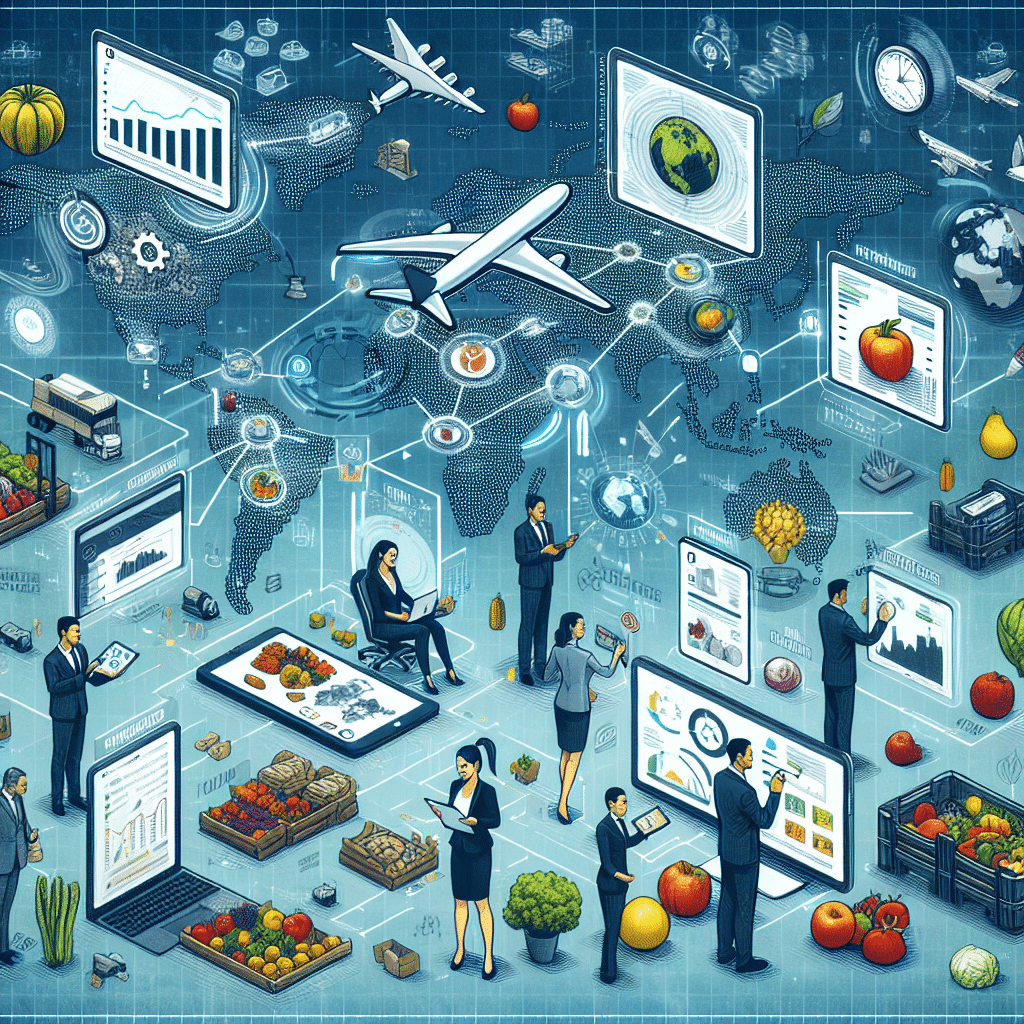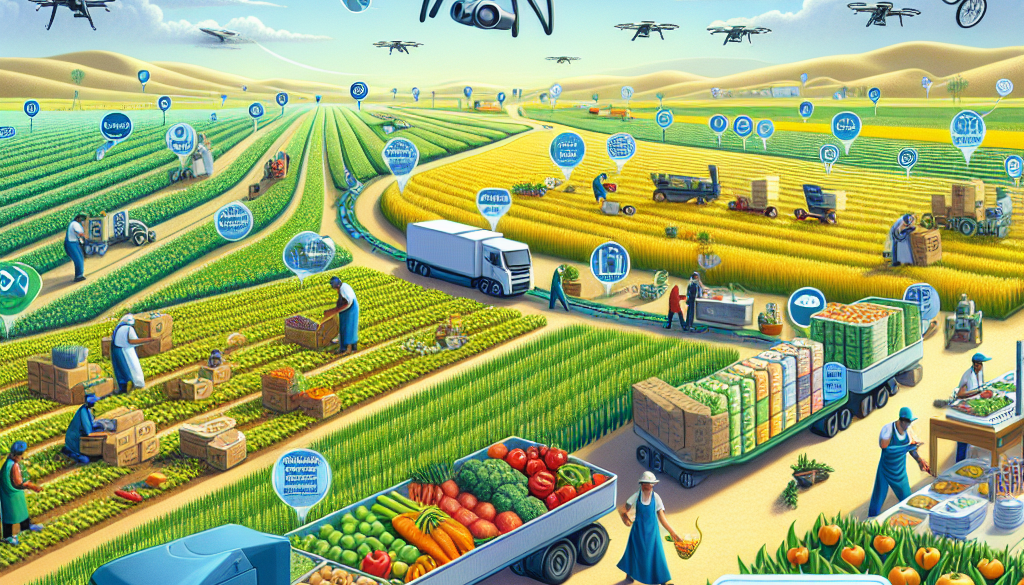Making Food Trackability Simpler In The Supply Chain Through Technology
-
Table of Contents
- Enhancing Food Trackability in Supply Chains with Advanced Technology
- The Importance of Food Trackability
- Technological Innovations in Food Trackability
- Blockchain Technology
- Internet of Things (IoT)
- RFID Technology
- Big Data and Analytics
- Case Studies: Success Stories of Technology in Food Trackability
- Challenges and Considerations
- Conclusion: The Future of Food Trackability
- ETprotein: Your Partner for High-Quality Protein Products
Enhancing Food Trackability in Supply Chains with Advanced Technology

The global food supply chain is a complex network that involves numerous stakeholders, including farmers, processors, distributors, retailers, and consumers. Ensuring the trackability of food products throughout this chain is crucial for maintaining food safety, reducing waste, and enhancing consumer trust. With the advent of technology, making food trackability simpler in the supply chain has become a tangible reality. This article explores how technology is revolutionizing the traceability of food products from farm to fork.
The Importance of Food Trackability
Before delving into the technological solutions, it’s essential to understand why food trackability is so important:
- Food Safety: Quick identification of the source of contaminated products can prevent widespread health issues.
- Waste Reduction: Efficient tracking systems can reduce spoilage and waste by optimizing the supply chain.
- Consumer Confidence: Transparency in the food supply chain increases consumer trust in food products.
- Regulatory Compliance: Adhering to food safety regulations often requires robust traceability systems.
Technological Innovations in Food Trackability
Several technologies are at the forefront of improving food trackability:
Blockchain Technology
Blockchain is a decentralized ledger that provides a secure and transparent way to record transactions. In the food industry, blockchain can be used to create an immutable record of every step a food product takes from source to store. This technology has been successfully implemented by companies like Walmart and IBM in their food traceability initiatives. According to a study by Juniper Research, blockchain deployments in the food supply chain could save the industry up to $31 billion by 2024.
Internet of Things (IoT)
IoT involves the use of sensors and connected devices to monitor the condition and location of food products in real-time. These devices can track temperature, humidity, and other environmental factors that are crucial for maintaining food quality. The IoT in the global food supply chain market size is expected to reach $4.9 billion by 2025, growing at a CAGR of 9.5% from 2020 to 2025, according to a report by MarketsandMarkets.
RFID Technology
Radio Frequency Identification (RFID) tags are used to store and retrieve data using electromagnetic fields. RFID tags can be attached to crates, pallets, or individual products, allowing for quick scanning and tracking throughout the supply chain. The use of RFID in the food industry can significantly reduce human error and improve efficiency.
Big Data and Analytics
Big data analytics can process vast amounts of data generated by the supply chain to provide insights into patterns and trends. This information can be used to optimize logistics, forecast demand, and prevent bottlenecks. By analyzing historical data, companies can also predict potential issues before they arise.
Case Studies: Success Stories of Technology in Food Trackability
Several companies have successfully implemented technology to improve food trackability:
- Walmart’s Blockchain Initiative: Walmart has partnered with IBM to use blockchain technology to trace the origin of over 25 products from 5 different suppliers. This initiative has reduced the time it takes to track produce from 7 days to just 2.2 seconds.
- Carrefour’s QR Code System: French retailer Carrefour introduced QR codes on their products, allowing customers to access detailed information about the origin and journey of the product by scanning the code with their smartphones.
Challenges and Considerations
While technology offers significant benefits for food trackability, there are challenges to consider:
- Integration: Integrating new technologies into existing systems can be complex and costly.
- Data Privacy: Ensuring the privacy and security of data within the supply chain is paramount.
- Standardization: Developing industry-wide standards for data sharing and technology use is necessary for interoperability.
Conclusion: The Future of Food Trackability
The future of food trackability in the supply chain is promising, with technology playing a pivotal role in enhancing transparency and efficiency. As these technologies continue to evolve and become more accessible, we can expect to see a more resilient and consumer-friendly food supply chain. The key takeaways from this article highlight the importance of food trackability and the transformative impact of technologies like blockchain, IoT, RFID, and big data analytics in making it simpler and more effective.
ETprotein: Your Partner for High-Quality Protein Products
In the context of food trackability, it’s essential to partner with suppliers who prioritize transparency and quality in their products. ETprotein is a company that stands out in this regard. They offer a wide range of organic bulk vegan proteins and L-(+)-Ergothioneine (EGT) products that are non-GMO, allergen-free, and of the highest purity. Their commitment to excellence makes them a reliable partner for businesses looking to ensure the integrity of their supply chain and meet consumer demand for high-quality, traceable protein products.
About ETprotein:
ETprotein, a reputable protein and L-(+)-Ergothioneine (EGT) Chinese factory manufacturer and supplier, is renowned for producing, stocking, exporting, and delivering the highest quality organic bulk vegan proteins and L-(+)-Ergothioneine. They include Organic rice protein, clear rice protein, pea protein, clear pea protein, watermelon seed protein, pumpkin seed protein, sunflower seed protein, mung bean protein, peanut protein, and L-(+)-Ergothioneine EGT Pharmaceutical grade, L-(+)-Ergothioneine EGT food grade, L-(+)-Ergothioneine EGT cosmetic grade, L-(+)-Ergothioneine EGT reference grade and L-(+)-Ergothioneine EGT standard. Their offerings, characterized by a neutral taste, non-GMO, allergen-free attributes, with L-(+)-Ergothioneine purity over 98%, 99%, cater to a diverse range of industries. They serve nutraceutical, pharmaceutical, cosmeceutical, veterinary, as well as food and beverage finished product distributors, traders, and manufacturers across Europe, USA, Canada, Australia, Thailand, Japan, Korea, Brazil, and Chile, among others.
ETprotein specialization includes exporting and delivering tailor-made protein powder and finished nutritional supplements. Their extensive product range covers sectors like Food and Beverage, Sports Nutrition, Weight Management, Dietary Supplements, Health and Wellness Products, and Infant Formula, ensuring comprehensive solutions to meet all your protein needs.
As a trusted company by leading global food and beverage brands and Fortune 500 companies, ETprotein reinforces China’s reputation in the global arena. For more information or to sample their products, please contact them and email sales(at)ETprotein.com today.












